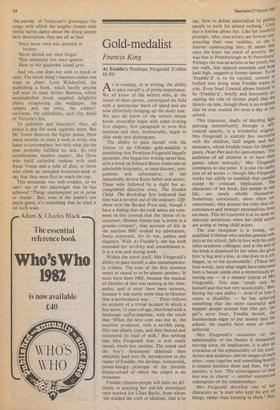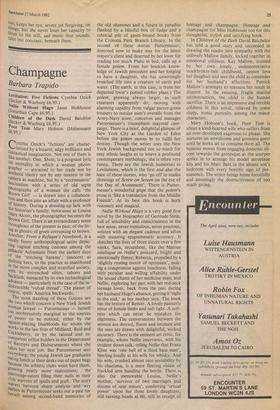Gold-medalist
Francis King
As in running, so in writing, the ability to pace oneself is of prime importance. We all know of the writers who, at the outset of their careers, outstripped the field with a spectacular burst of speed and are now effortfully bringing up the dusty rear. We also all know of the writers whose books invariably begin with some riveting first chapter, first paragraph or even first sentence and then, irretrievably, begin to slide away and disintegrate.
The ability to pace herself with the finesse of an Olympic gold-medalist is something that Penelope Fitzgerald happily possesses. She began her writing career late, with a book on Edward Burne-Jones and an admirable biography, at once discreet, sym- pathetic and informative, of her remarkably diverse Knox father and uncles. These were followed by a slight but ac- complished detective story, The Golden Child. The Bookshop first indicated that here was a novelist out of the ordinary. Off- shore won the Booker Prize and, though I have a feeling that she took amiss my com- ment in this journal that the theme of its successor, Human Voices was 'a storm in a powder-compact', that account of life in the wartime BBC evoked my admiration, freely expressed, for its fun, pathos and elegance. With At Freddie's, she has both extended her territory and consolidated it. It is a true and strong work.
Within the novel itself, Mrs Fitzgerald's ability to pace herself, is also instantaneous- ly evident. The tone of the first sentence seems so casual as to be almost careless: 'It must have been 1963, because the musical of Dombey & Son was running at the Alex- andra, and it must have been autumn, because it was surely some time in October that a performance was ... ' There follows an account of a trivial incident in which a boy actor, 11 years of age, interfered with a backstage coffee-machine, with the result that 'When the next coin was put in, the machine produced, with a terrible pang, fifty-one plastic cups, and then heaved and outpoured its load of milk.' But nothing that Mrs Fitzgerald does is ever really casual, much less careless. The prank and the boy's threatened digmissal then smoothly lead into the introduction to the reader of Freddie, the devious, resourceful, power-hungry principal of the juvenile drama-school of which the culprit is an ornament.
Freddie (theatre-people will have no dif- ficulty in guessing her real-life prototype) once worked for Lilian Baylis, from whom 'she studied the craft of idealism, that is to
say, how to defeat materialism by getting people to work for almost nothing.' Little else is known about her. Like her youthful proteges, who, true actors, 'are forever con- structing their own realities, so she i5 forever constructing hers. It seems that once she knew the worst of poverty. But was that in Peterborough or St Petersburg? Perhaps she was an actress in her youth, but her walk, feet splayed outwards and head held high, suggests a former dancer. To be 'Freddie'd' is to be cajoled, conned or bullied into doing what Freddie wants of you. Even Noel Coward allows himself to be 'Freddie'd', briefly and buoyantly ac- cepting the role of former pupil that she thrusts on him, though there is no evidence that he ever studied for even a day at her school.
This character, shafts of dazzling light piercing intermittently through a self- created opacity, is a wonderful original. Mrs Fitzgerald is scarcely less successful with the children, half angels and half monsters, whom Freddie trains for Shakes' peare, Peter Pan and the pantomimes. 'The ambition of all children is to have their games taken seriously,' Mrs Fitzgerald comments at one point. It is also the ambl' tion of all actors — though Mrs Fitzgerald works too subtly to establish that parallel except by constant implication. The characters of her book, like people in real life, are rarely wholly themselves. Sometimes consciously, more often un- consciously, they assume the roles that cir- cumstances and stronger personalities force on them. This let's-pretend is at its most in- sidiously pernicious when her child actors are acting at being child actors.
The one exception is a young, un- qualified Irishman who teaches general sub- jects at the school, falls in.love with his onlY other academic colleague, and at the end of the book is dismissed by her when she gives him 'a hug and a kiss, as one does to a col- league, or to the inconsolable'. (Those last four words, turn what might have otherwise been a banale simile into a mysteriously ar- resting one — in a manner typical of Mrs Fitzgerald). This man 'could only be himself and that not very successfully.' But, having this rare ability — even if to him it seems a disability — he has achieved something that the more successful and happier people around him (the girl, the girl's actor lover, Freddie herself, the businessman eager to put money into the school, the pupils) have none of them achieved.
Mrs Fitzgerald's evocation of the ephemerality of the theatre is immensely moving since, by implication, it is also an evocation of the ephemerality of life itself. Actors and audience, mirror images of each other, come together and something briefly is created between them and then, for all eternity, is lost. 'The extravagance of that loss was its charm' — another unexpected redemption of the commonplace.
Mrs Fitzgerald describes one of her characters as 'a man who kept his eye 011 things, rather than listening to them.' She,
too, keeps her eye, severe yet forgiving, on things; but she never loses her capacity to listen to the still, sad music that sounds, faint but constant, beneath them.





































 Previous page
Previous page